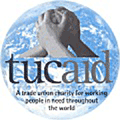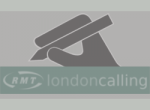 You can make a donation to help Haitian trade unions' reconstruction work by clicking the TUC Aid button here:
You can make a donation to help Haitian trade unions' reconstruction work by clicking the TUC Aid button here:
The statement below from the Haiti Support Group gives some of the social and political backgrond to the devastating loss of life in Haiti. It shows that although earthquakes are natural, the scale of their impact is largely down to social and political factors. Our thoughts are with the victims and their loved ones, and we are looking for opportunities to help trade unions and other progressive organisations in the mammoth tasks that face them.
THE EARTHQUAKE - a first reaction, 13 January 2010
The magnitude of this terrible tragedy is directly linked to the massive influx of people who have come to live in Port-au-Prince over recent decades. Hundreds of thousands of people have abandoned the countryside and come to capital to try and make a living. This human wave has overwhelmed the city and the rudimentary services that serve the city's population. The result is completely unregulated construction, poor or non-existent sanitation, a meagre supply of water, constant power outages, and the spread of poverty-stricken shantytowns. The loss of life from the earthquake, the potential for disease to spread, and the danger that many poor people will be left without water and food in the days ahead, are all far greater because there are too many people living in Port-au-Prince - over two million people are living in a city built to serve just a few hundred thousand.
The phenomenons of the rural exodus and the mushrooming size of Port-au-Prince are a consequence of the complete and continuing neglect of the rural sector by both the central government and the international finance institutions. There has been no significant investment in agriculture despite the fact that the vast majority of the population are peasant farmers. Next to nothing has been done to repair - let alone extend - irrigation systems. There are no subsidies for fertilisers, seeds or tools. And perhaps most damaging of all, the international planners have forced the authorities to eliminate import tariffs, and the resultant deluge of cheap foreign food imports that undercut local produce has been the final nail in the coffin of the Haitian farmer. Their sons and daughters have had to leave home, and instead scratch a living in the cities where they are at the mercy of the hurricanes, floods, and earthquakes that have afflicted this most unfortunate land.
Charles Arthur
Director, Haiti Support Group
NOTE: The Haiti Support Group is based in London, UK. It does not have staff in Haiti. It does not carry out humanitarian relief work in Haiti. It does not collect money for earthquake relief operations. It does not search for earthquake survivors. The Haiti Support Group is a solidarity organisation working with progressive organisations in Haiti which are struggling to carry out the fundamental structural changes necessary to improve the standard of living of the poor majority and to build a state that is capable of taking action to lessen the impact of natural disasters.
- 2828 reads





